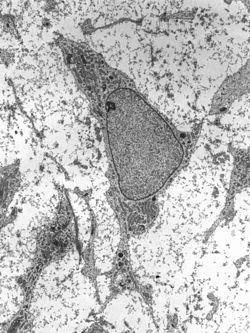
Back خلية جذعية بالغة Arabic Cèl·lula mare adulta Catalan Células madre adultas Spanish Célula nai adulta Galician Sel punca dewasa ID Cellula staminale adulta Italian 成体幹細胞 Japanese 성체줄기세포 Korean Volwassen stamcel Dutch 成体干细胞 Chinese
| Adult stem cell | |
|---|---|
 Transmission electron micrograph of an adult stem cell displaying typical ultrastructural characteristics. | |
| Details | |
| Identifiers | |
| Latin | cellula praecursoria |
| MeSH | D053687 |
| TH | H1.00.01.0.00035 |
| Anatomical terms of microanatomy | |
Adult stem cells are undifferentiated cells, found throughout the body after development, that multiply by cell division to replenish dying cells and regenerate damaged tissues. Also known as somatic stem cells (from Greek σωματικóς, meaning of the body), they can be found in juvenile, adult animals, and humans, unlike embryonic stem cells.
Scientific interest in adult stem cells is centered around two main characteristics. The first of which is their ability to divide or self-renew indefinitely, and the second their ability to generate all the cell types of the organ from which they originate, potentially regenerating the entire organ from a few cells.[1] Unlike embryonic stem cells, the use of human adult stem cells in research and therapy is not considered to be controversial, as they are derived from adult tissue samples rather than human embryos designated for scientific research. The main functions of adult stem cells are to replace cells that are at risk of possibly dying as a result of disease or injury and to maintain a state of homeostasis within the cell.[2] There are three main methods to determine if the adult stem cell is capable of becoming a specialized cell.[2] The adult stem cell can be labeled in vivo and tracked, it can be isolated and then transplanted back into the organism, and it can be isolated in vivo and manipulated with growth hormones.[2] They have mainly been studied in humans and model organisms, such as mice, rats and planarians.

- ^ Mahla RS (2016). "Stem Cells Applications in Regenerative Medicine and Disease Therapeutics". International Journal of Cell Biology. 2016: 6940283. doi:10.1155/2016/6940283. PMC 4969512. PMID 27516776.
- ^ a b c "4. The Adult Stem Cell | stemcells.nih.gov". stemcells.nih.gov. Archived from the original on 29 July 2018. Retrieved 7 March 2021.
© MMXXIII Rich X Search. We shall prevail. All rights reserved. Rich X Search